Dead by Sunset Read online
Page 4
Sara adored children although she had never been lucky enough to have any of her own. She had found Brad’s three young sons delightful from the moment he introduced them to her. Jess, Michael, and Phillip were as smart as their father, and well behaved. Sara and Brad took the boys sailing on a week’s vacation and it was as if they were already a family. Sara hated to say goodbye to them when they went back to their mother. And she worried about them. Brad had come to trust Sara so much that he gradually revealed more and more about what their mother was really like. He confided that she called the children four-letter words and screamed at them continually. The custody of his little boys was desperately important to Brad. All of his business success meant nothing—not if his children were being mistreated.
That summer Brad and his estranged wife wrangled constantly about the boys. It was the one shadow over Sara’s happiness. She heard Brad argue with his wife on the phone, though she never really saw the acrimony between them. She accompanied him sometimes when he went to pick up his sons, but she never spoke to his wife. “I saw her working in her yard,” Sara recalled. “Once, we took the boys back and she came running up, holding her arms out for Phillip. But we never talked.”
Sara worried about what effect all this was having on the boys, but she tried to stay out of the arguments. It wasn’t her place to interfere, and she was confident that Brad could handle things in the best way for his sons.
Sara continued to pay the rent on her fourteenth-floor apartment in the Madison Tower that summer, but she spent so little time there that it seemed like an empty space with no human energy. “I kept my clothes in my apartment, but I was basically living in Brad’s apartment,” she said. His apartment reflected both his taste and his ability to buy the best. He even had a baby grand piano—although he couldn’t play. It was only natural that Sara wanted to spend her few off-duty hours with Brad. “I was very much in love with him, and I thought he was very much in love with me.”
She had no reason to think otherwise. Brad assured her many times a day of his love. He was always on time to meet her or pick her up, he was always where he said he would be, and their time together was wonderful. In a sense, it was as if they were both recouping the years they had lost in bad relationships. Sara knew that Brad had been married four times and that he had been disappointed in love just as she had. But now, finally, almost serendipitously, they had found each other. They were both under forty and they could plan for so many good years together.
Except for all the hassle that Brad was having with his wife over the custody of Jess, Michael, and Phillip, Sara’s and Brad’s lives were idyllic. Her practice was well established, his business interests seemed to be booming, they loved each other, and they planned to get married as soon as Brad was divorced. Their days had fallen into a happy pattern. When Sara wasn’t working at Providence, she was with Brad. Every other weekend, they planned their time around Jess, Michael, and Phillip. And on the weekends that Sara was on call—as she often was—Brad took the boys to the park blocks or entertained them in his apartment. He had the boys in the middle of the week for a few days too. It seemed that he and his wife had calibrated their joint custody almost down to the minute.
Sara sensed that Brad was often sad, and he finally confessed to her that his wife was continuing to make his life miserable. Sara wondered just what kind of woman she was. Why did she have to make everything so difficult? Sara knew that she was a successful attorney, but she certainly sounded like a terrible mother.
Brad needed Sara—and not just because he was having such a bitter struggle to protect his sons. He suffered a wrenching loss in July. Sara was at Providence on an overnight shift when Brad called. He had just learned that his father, Sanford Cunningham, had died of a heart attack at his fishing cabin in Darrington, Washington. “He was sobbing so hard I could barely understand him,” Sara remembered. “He needed me, and I managed to find someone to cover for me so I could go home and be with him.”
Sara knew how close Brad had been to his father, and she tried to help him and his stepmother, Mary, too. She went with Brad and the boys to Yakima for Sanford Cunningham’s funeral. And afterward she said she would buy a practically new twenty-five-foot Prowler trailer that Mary and Brad’s father owned. Mary needed the money, and Sara paid her eight thousand dollars, far more than the book value of the trailer. They left the trailer in Yakima, but Brad drove his dad’s Chevy pickup truck back to Portland and kept it in the garage of the Madison Tower. He was grieving hard, but he went back to his job at the U.S. Bank, usually walking to work, although he owned several vehicles and Sara had a Toyota Cressida. He was in top shape and enjoyed the exercise.
All that summer, Brad and his wife continued to butt heads over the little boys. There were trips to child psychologists, endless meetings with their respective attorneys, and more dissension when it was time to register Jess for school. Brad had made arrangements for him to go to Chapman School near the Madison Tower, but on August 13 his wife apparently ignored his wishes completely and enrolled Jess in Bridlemile Elementary near her recently rented home in the West Slope area just outside of Portland.
When Brad found out, he was furious, “You can’t do that, Cheryl,” Sara heard him shout at his estranged wife over the phone. Her name was Cheryl—Cheryl Keeton.
3
Jim Karr, Cheryl Keeton’s half brother, had been living with her and her three sons at her rented home on the West Slope for about three months. He had gotten close to his nephews, Jess, Michael, and Phillip. “I was their ‘nanny,’” he later remembered. “I was there to take care of them while Cheryl was at work.”
Jim was fully aware of how acrimonious Cheryl’s divorce from Brad Cunningham had become, how they fought over every step in the process. He knew that it made her feel better just to have him living in her home. Although they seldom talked about it, it seemed to Jim that Cheryl lived in a constant state of dread. Brad wanted the boys. Cheryl wanted the boys. And sometimes it seemed that their fierce arguments would never end.
On Sunday, September 21, 1986, Jim Karr spent most of the day at a girlfriend’s house in Gresham and they watched the Seattle Seahawks’ football game. He usually felt guilty about leaving Cheryl alone too long, but not on that weekend. It was Brad’s weekend to have the boys, and Cheryl wasn’t home; she had gone up to Longview, Washington, on Saturday to visit their family and planned to stay overnight. There was no reason for Jim to be around the house. He didn’t expect Cheryl to return until sometime Sunday evening. It would, of course, be before seven because that was when Brad was supposed to have the boys back.
Jim called Cheryl about 7:30 P.M. to make sure that the boys had gotten home. He knew she worried if Brad didn’t bring them back right on the dot of seven. Cheryl was crying and upset when she answered the phone. “The boys aren’t home yet,” she said. “Brad had car trouble.”
“Should I come home?” Jim asked.
“No,” she said. “Not right away. It’ll be okay.”
With most divorcing couples, it would have been. But Jim knew that Brad threw a fit if Cheryl didn’t have the boys ready when it was his turn to take them, and Cheryl went nuts if they were even five minutes late getting home. But anybody could have car trouble, and evidently Brad had called Cheryl to tell her that he would be late.
Cheryl seemed nervous, Jim thought. True, she always seemed nervous these days; the subtle and not-so-subtle psychological war that Brad was waging against her kept her constantly on edge. She was always afraid that on some visitation Brad wasn’t going to bring the boys back—that he was just going to disappear and take her sons with him. But lately she seemed convinced that, if things looked bad for Brad in the custody fight, she herself wasn’t going to survive. Literally not survive. Whether her fears had any basis or not, Jim had caught them the way you catch an infectious disease. Cheryl was so smart and so intuitive, and yet she had become almost stoic when she told Jim that she might die soon—and that it would b
e his job to find out the truth.
That was nothing like Cheryl’s usual behavior. She had always been so strong, so resilient. One thing about his half sister, she had never, ever been passive. So even though Cheryl had told him he didn’t have to come home early that Sunday night, Jim was uneasy and he headed for the West Slope house within an hour after he spoke to her on the phone. When he drove up to the house at 9:15, he saw that all the lights were blazing, but Cheryl’s van wasn’t there.
That scared him.
Once inside the house, Jim noticed that the vacuum cleaner was sitting in the middle of the living-room floor. It looked as if Cheryl had rushed away in the middle of housecleaning. With a hollow feeling in his stomach, Jim walked quickly through the empty rooms. It was very quiet and his heart was beating too loudly. There was a note on the kitchen counter. It was from Cheryl, written on a sheet of paper she had torn from the notebook in which she recorded the content of all of Brad’s phone calls.
“I have gone to pick up the boys from Brad at the Mobil station next to the IGA. If I’m not back, please come and find me. . . . COME RIGHT AWAY!”
Cheryl would have written that note between 7:30 and 8:00, Jim thought, and she should have been back with Jess, Michael, and Phillip within fifteen minutes. Now it was almost 9:30. Jim called their mother, Betty, in Longview, an hour’s drive north of Portland. Betty picked up the phone before the first ring had even ended. When Jim told her that Cheryl had obviously left the house in a hurry, and then read the note, Betty started to sob. That scared Jim even more. That wasn’t like his mother.
“She’s dead,” Betty cried. “She called me. I told her not to meet Brad alone. I know she’s dead.”
Jim tried to comfort his mother. He said there had to be a reasonable explanation why Cheryl wasn’t back yet. He told her he was heading down to the Mobil station, and he promised to call her as soon as he got back. But Jim knew that the station had been closed down two days earlier, the windows soaped over, the pumps empty. It would be very lonely and dark at night. It was an odd place for Brad to bring the boys for Cheryl to pick up. If he was having car trouble, there would be nobody at the Mobil station to work on it.
Still, Jim kept hoping that he would find his sister there, loading up her precious sons, just beginning to start for home. It was a short drive, but his mind went over a dozen possible reasons why Cheryl would be there, safe.
She was not there.
The Mobil station was dark and deserted, just as he had expected. The place was abandoned. It was out of business. Even the IGA supermarket next door was closed for the night. Jim scanned the parking lot there for Cheryl’s Toyota van, but he didn’t see it. There were only a few cars, probably those of employees who were emptying the cash registers and preparing night bank deposits inside the store.
Jim returned to Cheryl’s house and when he stepped out of his car, a figure emerged from the shadows. It was Jerry Finch, who was there to find out what he could about the woman whose body was now on the way to the Medical Examiner’s office. He asked Jim Karr to identify himself, and when he learned that Jim was Cheryl Keeton’s brother, he drew a deep breath. He had to tell Karr the monstrous truth. It was a truth that somehow Jim already knew.
His sister was dead.
Jim wasn’t even very surprised. That was why his mother had sobbed when he called her. Every single one of them in the family had tried to save Cheryl, as if they could somehow build a wall of love and solidarity around her so strong that nothing and no one could harm her. And yet, all the time, they had known it was like trying to stop Mount St. Helens from erupting. Something had to blow, something inevitable, and all the love and concern in the world never could have stopped it.
“He did it,” Jim Karr shouted to Jerry Finch. “That bastard did it!”
He didn’t say which bastard.
4
It was a quarter to midnight when a group of law enforcement officers headed to the Madison Tower to inform Brad Cunningham that his estranged wife was dead. Because they had no idea what they might find when they got there, Detectives Jerry Finch and Jim Ayers and Senior Trooper Keith Mecklem from the Oregon State Police had asked for backup from the Portland Police Bureau. Officer Richard Olsen joined them in the parking lot of the new apartment complex.
Together the four men took the elevator to Cunningham’s floor. A railed walkway ran around the perimeter and the apartment’s main door opened off that. Rick Olsen stood back near the rail as the State Police investigators knocked on the door of Cunningham’s apartment, watching silently while Finch and Ayers spoke to the tall dark-haired man who answered the door. Olsen could not hear the conversation, but he could see the face of the man in the doorway and knew that he had just been told his wife was dead. Olsen heard no loud exclamations, and he saw no emotion flicker across the man’s face. “He didn’t look surprised or shocked or agitated,” Olsen would later recall.
That didn’t necessarily mean anything. Shock does funny things to people. They can hear their whole world end in one sentence and never blink an eye. Not until later. For that matter, there are no rules about how the human mind or the human body will react in any given situation. People have been known to sustain a bullet wound to the heart and run half a block before they drop.
Ordinarily it would not have taken four officers to bring such terrible news to the family of the deceased. But Finch and Ayers were already convinced that Cheryl Keeton had not died in an automobile accident; she had been murdered. At this point in the investigation, they could not say whose powerful hand held the weapon that had struck her repeatedly, could not say who had then maneuvered her van onto the eastbound lanes of the Sunset Highway where it was almost certain to be struck by other vehicles.
Finch had talked with Cheryl’s half brother, Jim Karr, who had reacted in a more predictable way to ghastly news. He had shouted, “He did it. That bastard did it,” and handed over the note Cheryl had left behind. Finch had told Ayers about the note as they drove to the Madison Tower. Even so, they were still only at the embryonic—and dicey—stage of this investigation. They knew who Jim Karr meant by “that bastard,” but there was a great deal more they needed to know.
When Brad Cunningham came to the door, he was barefoot and wearing a gray University of Washington T-shirt and reddish orange jogging shorts. Ayers noted that he seemed wide awake, not like a man roused from sleep. And when he told Brad quietly that his estranged wife, Cheryl Keeton, had been killed, Brad blurted out, “Was it in a traffic accident?”
“No.” Ayers offered no more explanation.
“How—?”
Even up close, the Oregon State Police detectives could discern no sign of grief on Cunningham’s face. That wasn’t too unusual; Cheryl Keeton was apparently his estranged wife—not a woman, perhaps, who was still a big part of his life or even a woman he had any fond feelings for. Divorces could be bitter. Ayers had recently gone through one himself. He knew too well how nerves and emotions can be frayed in the wringer of divorce.
“How?” Brad Cunningham asked again. “How was she killed?”
“We haven’t determined that yet,” Ayers said. That much was true. There wouldn’t be a postmortem examination until the next day. Ayers wasn’t about to reveal his own conclusions.
“Should I contact an attorney?” Brad asked next.
Now that was a little over the line. They were still in the doorway of this man’s apartment, he had just heard that his estranged wife was dead, he hadn’t been told how she had died, and he was already asking if he needed a lawyer.
“You could, I suppose,” Ayers said slowly. “But we’re only here to see what your last contact with her was.”
Brad finally opened the door wide enough for the detectives to go inside. Rick Olsen stayed outside on the walkway, Trooper Mechlem waited in the front hallway of the apartment, and Jerry Finch deliberately stayed behind in the living room so Cunningham wouldn’t feel that they were “double-teaming” him. Br
ad led Ayers into the dining room and gestured for him to take a seat at the table. They began to talk, an edgy and strange conversation. After a while Finch walked into the dining room and sat at the end of the table. Brad was leaning casually on his elbows, looking at Ayers who sat directly across from him.
They would talk for almost two hours. At one point early in their conversation, Brad moved to the back of the apartment to check on his sons. He said that he didn’t want them to wake up and find their home full of strangers. Later, Brad would recall leaving his conversation with Ayers because he was so upset that he had to vomit. But Ayers could not locate that violent reaction in his memory. He heard no one vomiting in the apartment that night.
Ayers did not Mirandize Brad Cunningham. There was no reason to—he wasn’t a suspect. He was merely one of the bereaved in this tragedy. Ayers only asked Brad when he had last seen Cheryl Keeton.
Brad recalled the weekend just past for Ayers. He hadn’t seen Cheryl, he said, since sometime between 5:30 and 7:00 on Friday evening when he had picked the boys up for their weekend visit with him. He either forgot or chose not to mention that Cheryl had broken their custody agreement by showing up at Jess’s soccer game at the Bridlemile playing field on Saturday.
“Today—today . . .” Brad struggled to recall, running his mind back over the previous twenty-four hours, when Ayers asked him to try to give as much detail as he could about that Sunday.
“I took the boys to the park to play.”
“What about earlier this evening?” Ayers asked.
“We went to meet my fiancée, Dr. Sara Gordon,” Brad said. “She was on call at Providence Hospital. We went out for pizza with the boys.” Brad said that Sara had his Chevrolet Suburban and that he was driving her Toyota Cressida. He did not mention why they had switched vehicles.

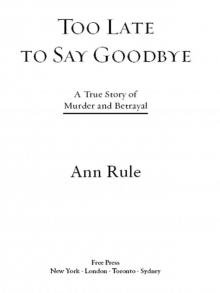 Too Late to Say Goodbye: A True Story of Murder and Betrayal
Too Late to Say Goodbye: A True Story of Murder and Betrayal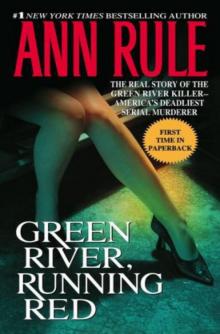 Green River, Running Red
Green River, Running Red Bitter Harvest
Bitter Harvest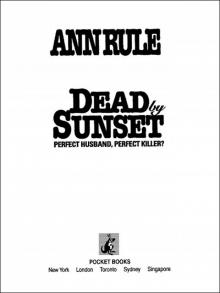 Dead by Sunset: Perfect Husband, Perfect Killer?
Dead by Sunset: Perfect Husband, Perfect Killer?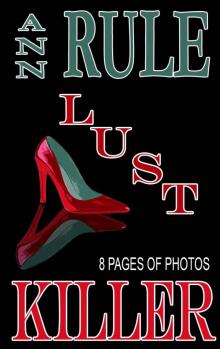 Lust Killer
Lust Killer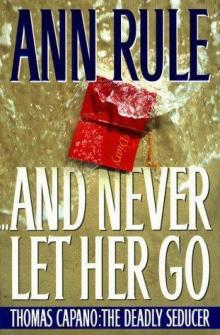 And Never Let Her Go: Thomas Capano: The Deadly Seducer
And Never Let Her Go: Thomas Capano: The Deadly Seducer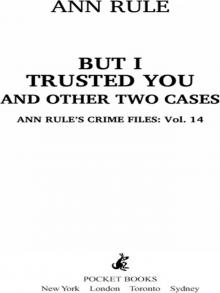 But I Trusted You and Other True Cases
But I Trusted You and Other True Cases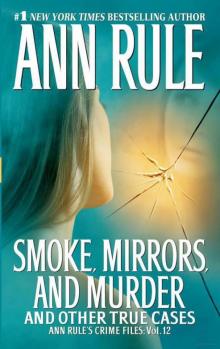 Smoke, Mirrors, and Murder and Other True Cases
Smoke, Mirrors, and Murder and Other True Cases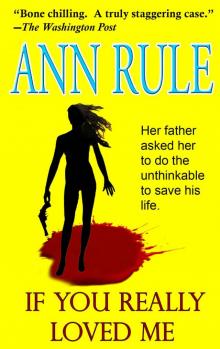 If You Really Loved Me
If You Really Loved Me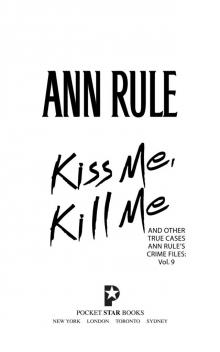 Kiss Me, Kill Me and Other True Cases
Kiss Me, Kill Me and Other True Cases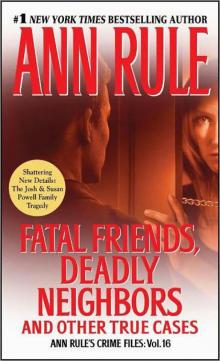 Fatal Friends, Deadly Neighbors and Other True Cases
Fatal Friends, Deadly Neighbors and Other True Cases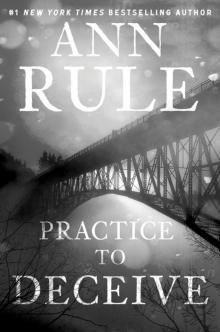 Practice to Deceive
Practice to Deceive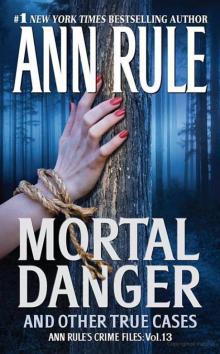 Mortal Danger and Other True Cases
Mortal Danger and Other True Cases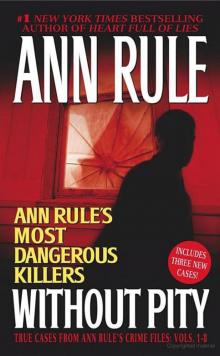 Without Pity: Ann Rule's Most Dangerous Killers
Without Pity: Ann Rule's Most Dangerous Killers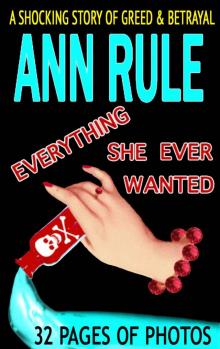 Everything She Ever Wanted
Everything She Ever Wanted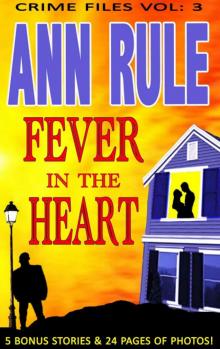 A Fever in the Heart and Other True Cases
A Fever in the Heart and Other True Cases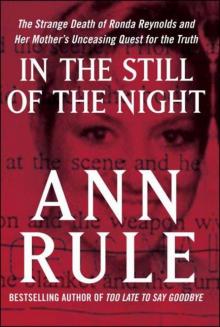 In the Still of the Night
In the Still of the Night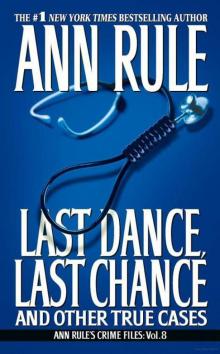 LAST DANCE, LAST CHANCE - and Other True Cases
LAST DANCE, LAST CHANCE - and Other True Cases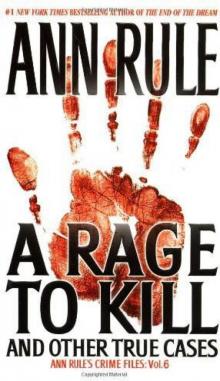 A Rage to Kill
A Rage to Kill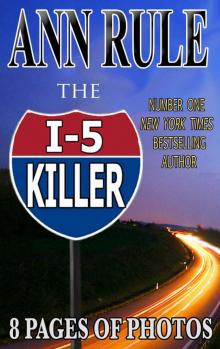 The I-5 Killer
The I-5 Killer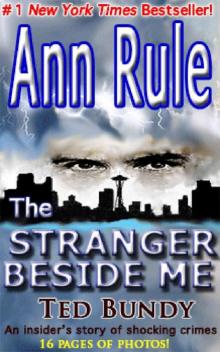 The Stranger Beside Me
The Stranger Beside Me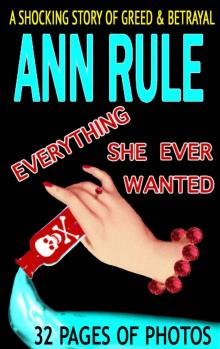 Everything She Ever Wanted: A True Story of Obsessive Love, Murder, and Betrayal
Everything She Ever Wanted: A True Story of Obsessive Love, Murder, and Betrayal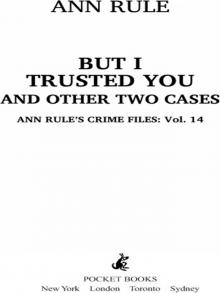 But I Trusted You
But I Trusted You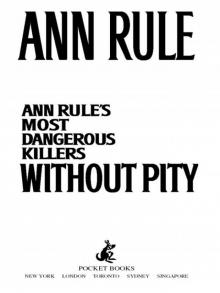 Without Pity
Without Pity Kiss Me, Kill Me
Kiss Me, Kill Me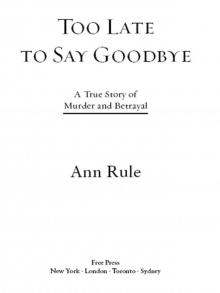 Too Late to Say Goodbye
Too Late to Say Goodbye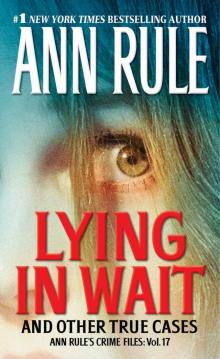 Lying in Wait
Lying in Wait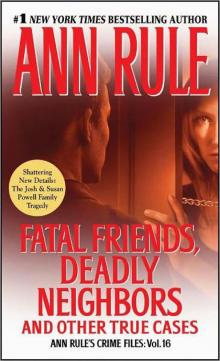 Fatal Friends, Deadly Neighbors
Fatal Friends, Deadly Neighbors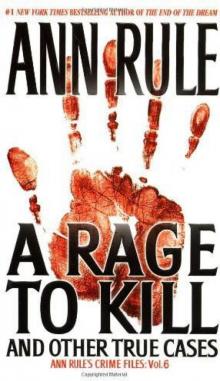 A Rage to Kill: And Other True Cases
A Rage to Kill: And Other True Cases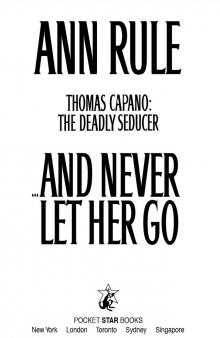 And Never Let Her Go
And Never Let Her Go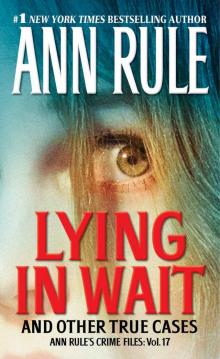 Lying in Wait Ann Rule's Crime Files Vol.17
Lying in Wait Ann Rule's Crime Files Vol.17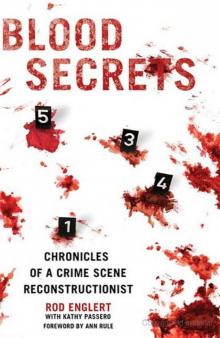 Blood Secrets: Chronicles of a Crime Scene Reconstructionist
Blood Secrets: Chronicles of a Crime Scene Reconstructionist No Regrets
No Regrets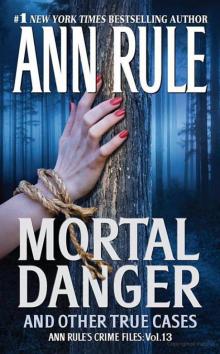 Mortal Danger
Mortal Danger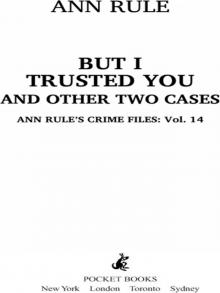 But I Trusted You: Ann Rule's Crime Files #14
But I Trusted You: Ann Rule's Crime Files #14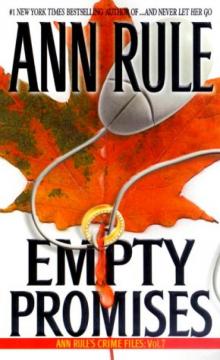 Empty Promises
Empty Promises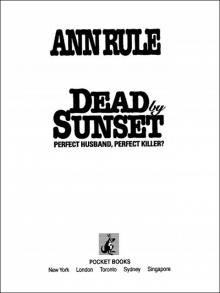 Dead by Sunset
Dead by Sunset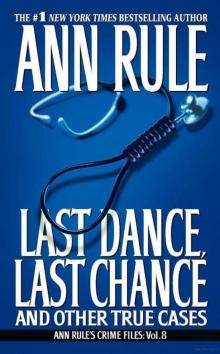 Last Dance, Last Chance
Last Dance, Last Chance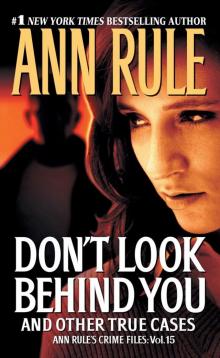 Don't Look Behind You
Don't Look Behind You